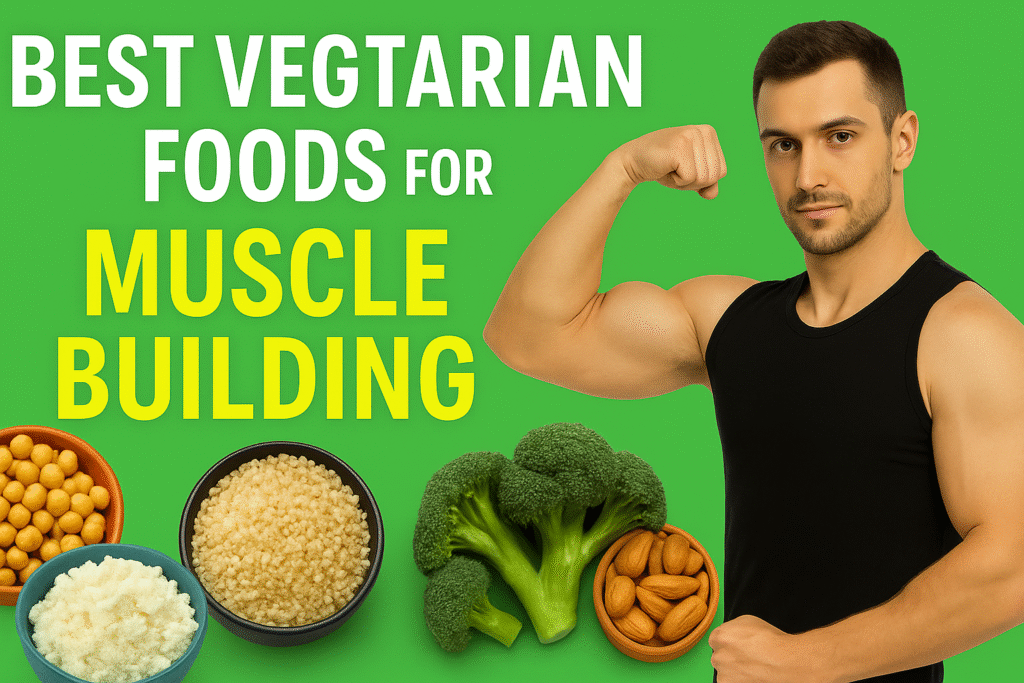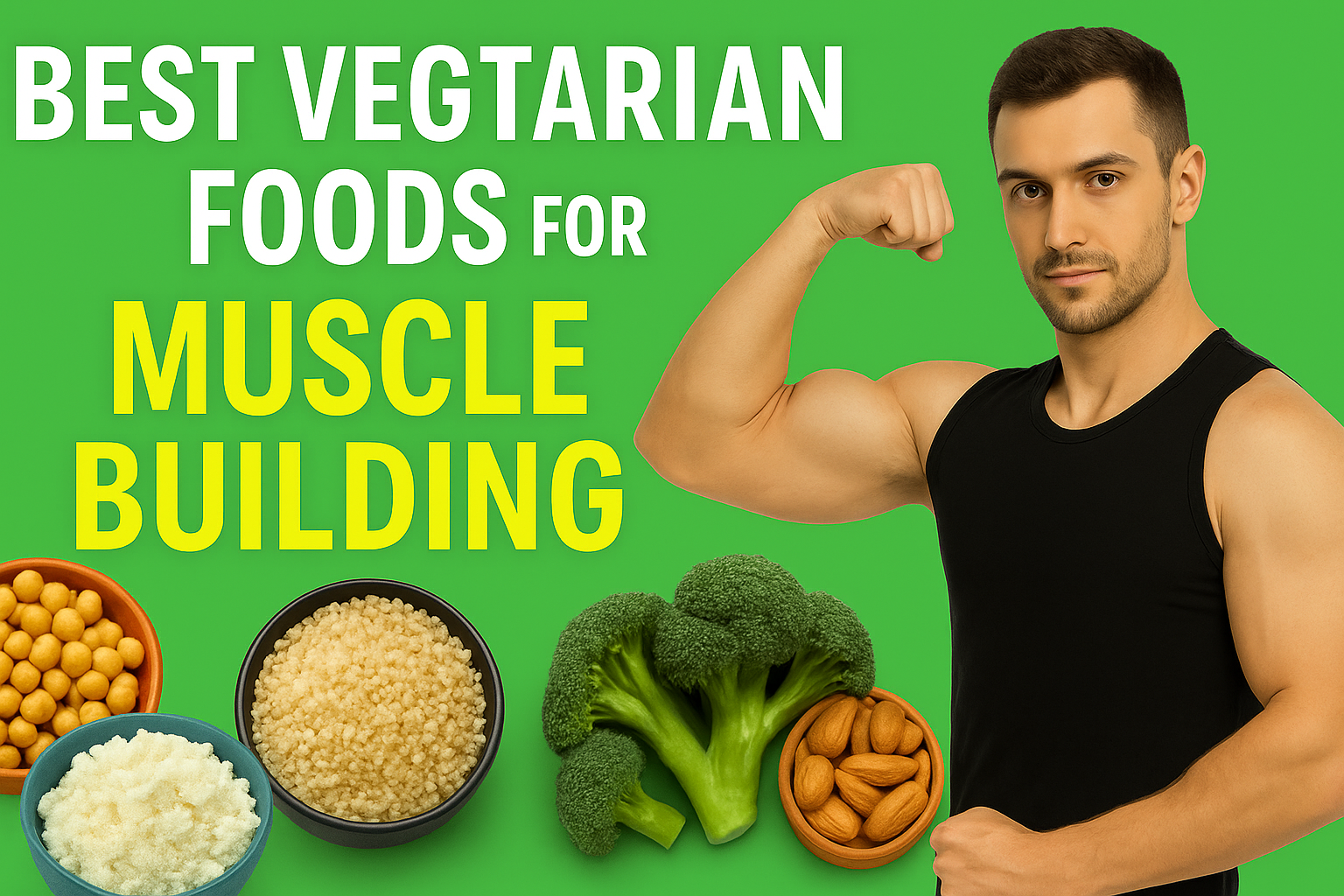Introduction
Building muscle on a vegetarian diet might sound challenging to some, but the truth is — it’s absolutely possible. With the right combination of plant-based proteins, essential amino acids, vitamins, and minerals, vegetarians can achieve impressive muscle growth and recovery just like non-vegetarians.
In this article, we’ll explore the best vegetarian foods for muscle building, how to combine them effectively, and smart nutrition tips to maximize your gains — naturally and ethically.

Why Protein Matters for Muscle Growth
Muscle growth, or hypertrophy, happens when your bo dy repairs the tiny tears in muscle fibers caused by exercise — especially strength training.
This repair process requires protein, which provides amino acids — the building blocks of muscle.
According to the National Academy of Sports Medicine (NASM), the average person aiming to build muscle should consume about 1.6 to 2.2 grams of protein per kilogram of body weight per day.
The good news? Even without meat or eggs, there are plenty of protein-rich vegetarian foods that can fuel your workouts and recovery.
Top 12 Best Vegetarian Foods for Muscle Building
Let’s dive into the most powerful vegetarian foods that support muscle growth and repair.
1. Paneer (Cottage Cheese)
Protein: ~18g per 100g
Paneer is a staple in most vegetarian diets and an excellent source of slow-digesting casein protein, which provides a steady release of amino acids. It also contains calcium and healthy fats, promoting bone strength and hormone balance.
2. Lentils (Dal)
Protein: ~9g per 100g (cooked)
Lentils are a powerhouse of plant-based protein, fiber, and iron. They help with muscle recovery, digestion, and energy levels — all crucial for consistent workouts. Mix two types of lentils (like masoor + moong) to improve amino acid balance.
3. Chickpeas (Chana)
Protein: ~19g per 100g (dry)
Chickpeas are loaded with protein, complex carbs, and fiber, making them perfect for pre- or post-workout meals. They also stabilize blood sugar and provide long-lasting energy. Roast chickpeas for a crunchy protein snack or add them to salads.
4. Greek Yogurt
Protein: ~10g per 100g
Greek yogurt is thicker and richer than regular yogurt and contains double the protein. It’s also packed with probioticsfor gut health and calcium for strong bones. Mix Greek yogurt with fruits or oats for a quick protein-packed breakfast.
5. Tofu
Protein: ~15g per 100g
Made from soybeans, tofu is a great complete protein and an excellent alternative to meat. It’s also rich in iron, calcium, and magnesium, essential for muscle recovery. Grill or stir-fry tofu with veggies for a tasty, muscle-friendly meal.
6. Soy Chunks
Protein: ~52g per 100g (dry)
Soy chunks are one of the richest vegetarian protein sources. They’re easy to cook, inexpensive, and have all essential amino acids required for muscle growth. Include soy chunks in curries, pulao, or salads, just soak them before use.
7. Almonds and Peanuts
Protein: ~6g per 30g (about a handful)
These nuts are great sources of healthy fats, protein, and Vitamin E, which supports muscle repair and reduces inflammation. Eat a handful of almonds or peanuts as a pre-workout energy booster.
8. Oats
Protein: ~5g per 50g serving
Oats provide a steady release of complex carbohydrates and moderate protein, keeping you fueled for workouts and recovery. They also contain beta-glucan, which supports heart health. Combine oats with milk or Greek yogurt for a balanced breakfast.
9. Eggless Protein Powders
If you struggle to meet your protein needs through food alone, consider plant-based protein powders like pea protein, brown rice protein, or hemp protein. They help bridge nutritional gaps and support post-workout recovery. Mix one scoop in a smoothie with banana and peanut butter for extra calories and taste.
10. Broccoli, Spinach, and Leafy Greens
These may not be high in protein, but they’re packed with iron, magnesium, and antioxidants — nutrients that support oxygen flow, muscle contraction, and recovery. Add them to smoothies or salads daily for overall performance.
Smart Nutrition Tips for Vegetarian Muscle Building
Building muscle on a vegetarian diet is not just about eating protein — it’s about eating right, consistently, and in the right combinations.
Here are a few pro tips:
- Combine Protein Sources:Mix different vegetarian proteins (like dal + rice or roti + paneer) to create a complete amino acid profile.
- Eat Enough Calories:Without enough calories, your body won’t have the energy to build new muscle. Track your intake using apps like MyFitnessPal.
- Prioritize Post-Workout Meals:After workouts, eat a mix of protein (for repair) and carbs (for energy recovery) within 45 minutes.
- Stay Hydrated:Muscles are 75% water. Dehydration slows recovery and reduces strength.
- Sleep and Rest Well:Muscles grow during rest, not during workouts. Aim for 7–8 hours of quality sleep.
Common Mistakes Vegetarians Make
Even motivated vegetarians sometimes make errors that limit their gains:
Avoid these pitfalls to see steady progress.
- Skipping protein-rich snacks
- Overeating carbs and fats
- Not supplementing Vitamin B12 or Omega-3s
- Ignoring strength training consistency
Optional Supplements (for Vegetarians)
Though whole foods should be your foundation, a few supplements can help:
Multivitamin – to cover micronutrient gaps.
Plant-Based Protein Powder – to meet daily protein goals.
Creatine Monohydrate – boosts strength and power.
Vitamin B12 – essential for energy metabolism.
Omega-3 (Algae-based) – for joint health and inflammation control.
Conclusion
Building muscle on a vegetarian diet is completely achievable — with the right foods, discipline, and smart planning. From paneer and tofu to lentils and quinoa, nature offers plenty of options to help you grow stronger and healthier without meat.
Remember, muscle building isn’t about what you don’t eat, it’s about how wisely you choose what you do eat.
Stay consistent with your workouts, track your nutrition, and fuel your body with wholesome vegetarian foods, and you’ll see real, sustainable gains.
Quick Summary Table
| Food Item | Protein (per 100g) | Key Benefit |
|---|---|---|
| Paneer | 18g | Slow-digesting protein |
| Lentils | 9g | Fiber + Iron |
| Chickpeas | 19g | Energy + Recovery |
| Quinoa | 8g | Complete amino acids |
| Greek Yogurt | 10g | Gut health + Protein |
| Tofu | 15g | Complete plant protein |
| Soy Chunks | 52g | High protein density |
| Almonds | 6g (per 30g) | Healthy fats |
| Oats | 5g (per 50g) | Sustained energy |
| Milk | 8g (per cup) | Casein + Whey mix |
